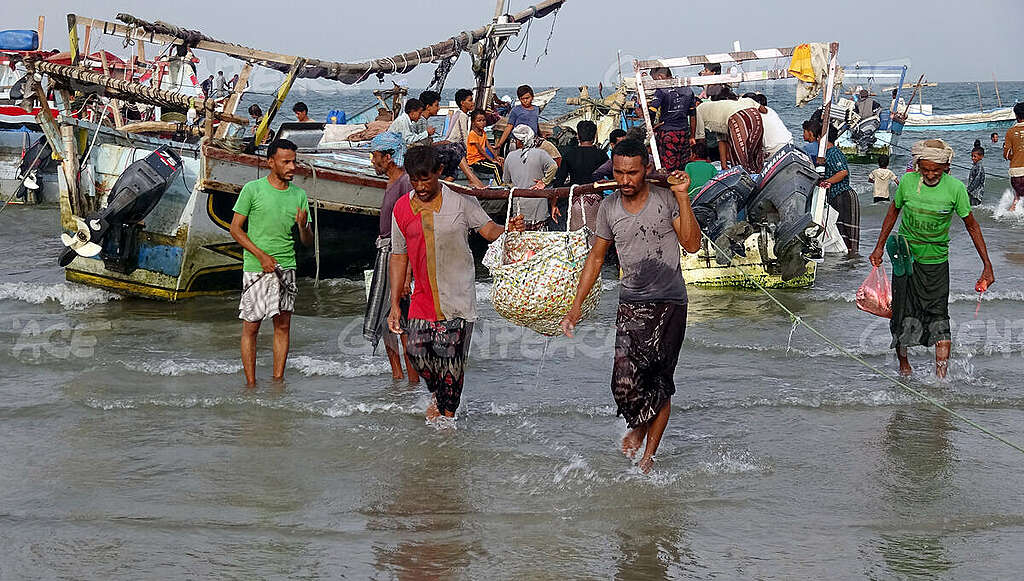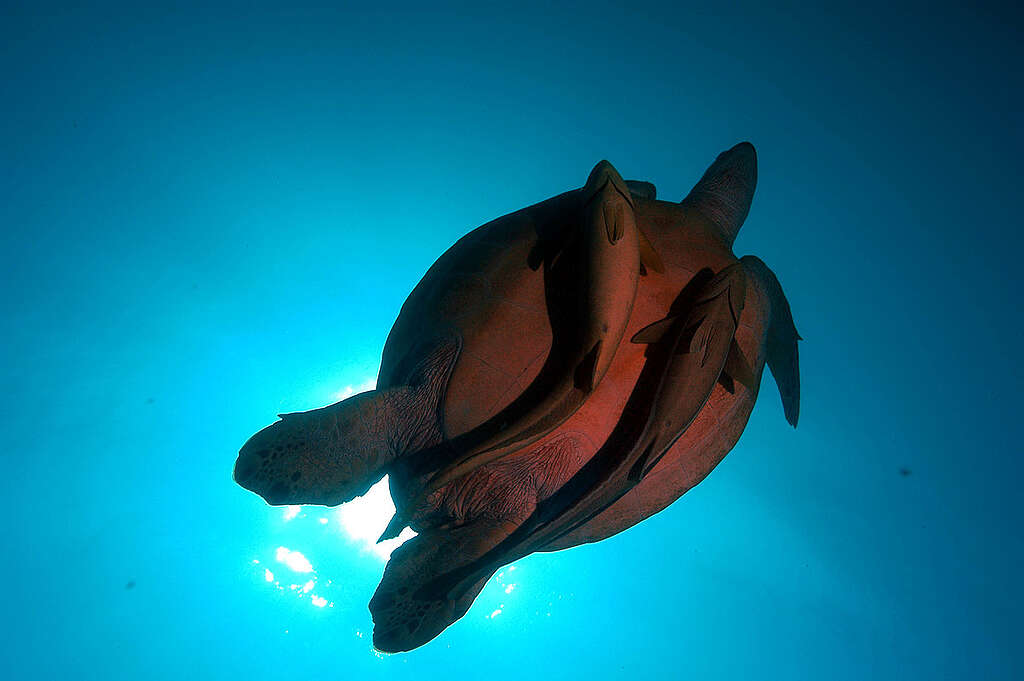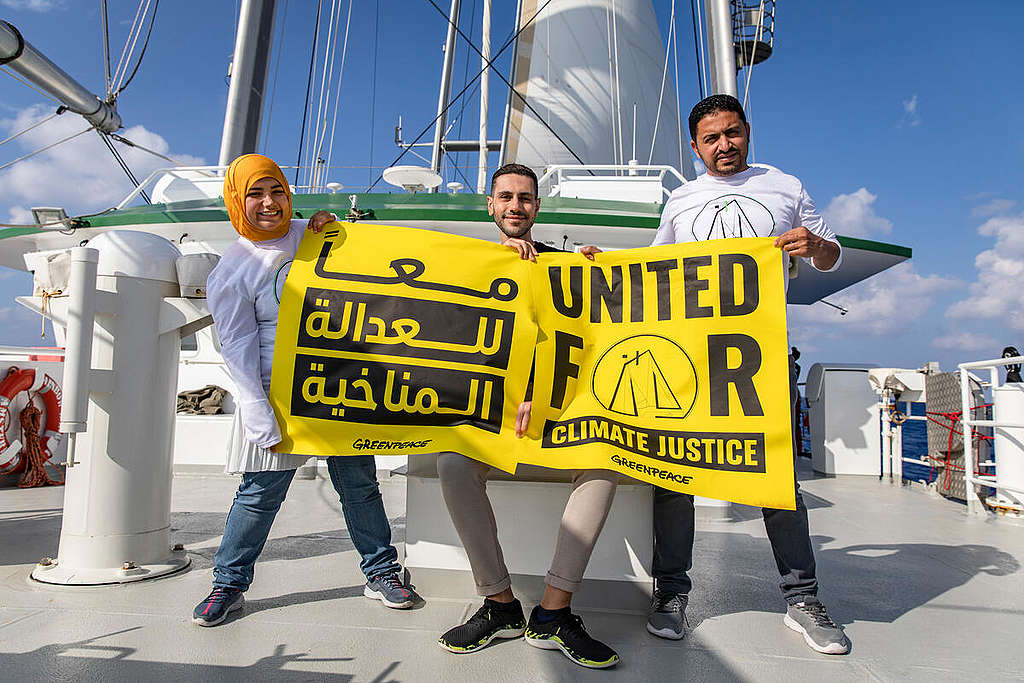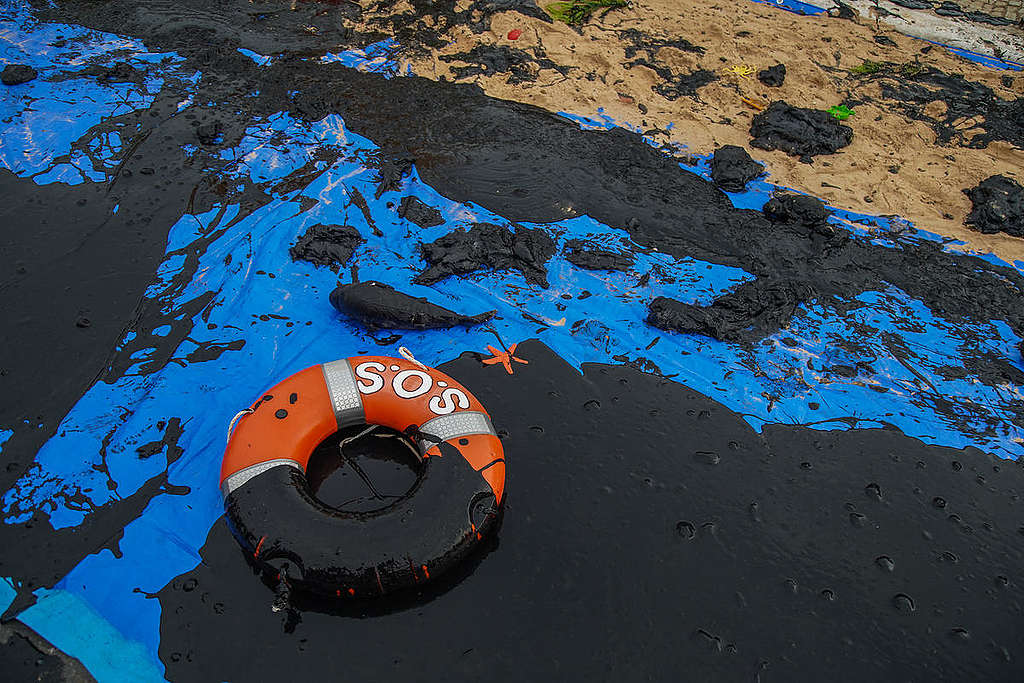After more than eight years of relentless effort and numerous hurdles, the UN-led hazardous operation to remove more than a million barrels of oil from the decaying FSO SAFER supertanker off Yemen’s coast and scrap the ageing vessel has taken a major step towards a safe conclusion.
This momentous achievement means the almost decade-long saga is in the home stretch, highlighting the power of collective action, but also exposing the heartless indifference of the oil industry to the consequences of its actions.
Crisis averted
The FSO SAFER, once a looming threat on the horizon of the Red Sea, is now rid of its perilous cargo. This success stands as a testament to international cooperation, determination, and the unwavering commitment of organisations like Greenpeace, Holm Akhdar and other allies which played a pivotal role in galvanising global awareness about the impending dangers posed by the deteriorating supertanker.
Years of tireless advocacy and collaboration have culminated in the commencement and successful completion of the operation. The fact that the operation was necessary in the first place underscores not only the remarkable feat of averting disaster but also serves as a stark reminder that too often, communities and governments are left to clean up the mess created by the oil industry.
The potential consequences of an oil spill in the Red Sea cannot be overstated. It could inflict irreparable damage on coastal communities, fragile ecosystems, and marine life, exacerbating both the ongoing humanitarian crisis and the impacts of the climate crisis in the region.
 A Yemeni farmer sells freshly picked dates during the annual harvest season in al-Durayhimi district of Yemen’s war-ravaged western province of Hodeida. © AFP via Getty Images
A Yemeni farmer sells freshly picked dates during the annual harvest season in al-Durayhimi district of Yemen’s war-ravaged western province of Hodeida. © AFP via Getty ImagesMake polluters pay
As we commemorate this significant milestone, it is crucial to confront a disheartening reality: the very oil companies behind this perilous situation have demonstrated a glaring lack of responsibility. Despite reaping record profits, these major polluters have abdicated their obligation to address the potential risks and consequences posed by the FSO SAFER.
Oil giants such as TotalEnergies, Exxon, OMV, and Occidental, beneficiaries of the SAFER’s operations, have not taken meaningful action to forestall a potential oil spill catastrophe in the Red Sea. These transnational polluters should be paying the estimated US$140 million cost of the salvage operation. Instead, UN members, the private sector and individuals from all over the world have contributed US$121 million, with another estimated US$22 million still needed.
This underscores the urgent necessity for heightened accountability within the oil industry, laying bare the stark disparity between financial gains and ethical responsibility.
 Yemeni fishermen bring their catch off boats at a beach in the Red Sea coast in the Khokha district of Yemen’s western province of Hodeida. © KHALED ZIAD / AFP via Getty Images
Yemeni fishermen bring their catch off boats at a beach in the Red Sea coast in the Khokha district of Yemen’s western province of Hodeida. © KHALED ZIAD / AFP via Getty ImagesShipbreaking: Do no harm
Even as we celebrate the successful resolution of the immediate FSO SAFER crisis, it is crucial to acknowledge that the journey is far from over. The legacy of neglect and disregard for environmental consequences demands a transformative shift in the oil industry’s practices. Oil companies that have used this vessel to shovel money into their coffers should pay for its scrapping in environmentally sustainable ways that safeguard against potential harm its disposal could inflict on other communities.
We agree with the NGO Shipbreaking Platform call for the vessel to be recycled in a yard that complies with the EU-Ship Recycling Regulations. Such facilities are also found in non-EU countries. The concern lies in the possibility of the UN opting for cheaper options to scrap the ship, driven by insufficient funding. This scenario could lead to the SAFER winding up on one of the ship scrapping shores in South Asia dismantled under rudimentary conditions, with harmful consequences for the host country and its people.
It would be a tragedy to have averted one disaster in the Red Sea only to have another impacting people elsewhere.
Yemen oil risk not over
It’s also vital to emphasise that storing the oil in a new vessel cannot be a final solution. Although the YEMEN tanker is in notably better condition than the SAFER, the crisis can only be fully mitigated by safely and completely removing the oil from Yemeni waters.
 “Cleaner” fish known as Remora hitch a ride with a turtle in the Red Sea © Greenpeace / Marco Care
“Cleaner” fish known as Remora hitch a ride with a turtle in the Red Sea © Greenpeace / Marco CareDemand climate justice
The salvage operation serves as a poignant reminder of the pressing need to liberate ourselves from the shackles of fossil fuels. The long-running FSO SAFER saga underscores the imperative for the oil industry to reckon with its complicity in the climate and nature crisis and to take decisive measures to rectify the damage it has caused.
Success in averting a catastrophic oil spill in the Red Sea offers a moment of reflection and inspiration, reiterating the urgent demand for accountability, sustainability, and climate justice in our relentless pursuit to safeguard our planet and the generations that will inherit it.
Ghiwa Nakat is the Executive Director of Greenpeace Middle East North Africa.
 Youth climate champions, United for Climate Justice campaign, on-board the Rainbow Warrior.
Youth climate champions, United for Climate Justice campaign, on-board the Rainbow Warrior.
Don’t look away from the people of Yemen and the Red Sea. Tell oil companies that polluters must pay, not people

 9 months ago
45
9 months ago
45

 Huge victory for our planet! After three intense weeks, we've averted a potential humanitarian and ecological catastrophe.
Huge victory for our planet! After three intense weeks, we've averted a potential humanitarian and ecological catastrophe.
 Over a million decaying FSO SAFER oil barrels are now safely aboard the newly renamed YEMEN supertanker.
Over a million decaying FSO SAFER oil barrels are now safely aboard the newly renamed YEMEN supertanker. 


